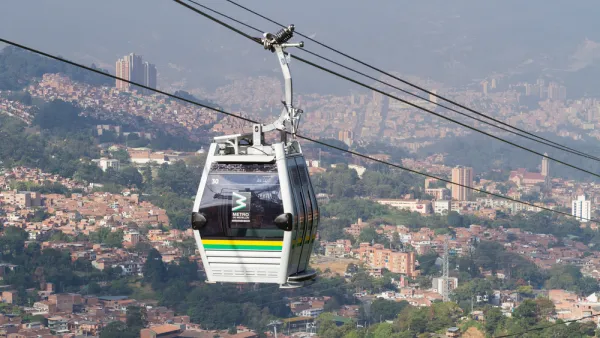London's Olympics are just the most recent example of the growing trend in building temporary architecture and urbanism in response to financial and practical considerations. Christopher Hawthorne asks whether this trend is too short sighted.
With cities from Los Angeles to London embracing lighter, quicker, cheaper ways to implement improvements to their environments in a wobbly world economy, "individual
clients and institutions will continue to turn to expedient architecture
as the only way to get their buildings or parks financed," writes Hawthorne. In the rush to embrace expediency, however, are officials and designers ignoring the larger implication of such projects on planning, preservation, and urban design?
Hawthorne looks at several temporary projects in Los Angeles to poke at the question. Ultimately, he seems to believe that building something is better than nothing, and in a city like Los Angeles, which over time has been reluctant to significantly invest in its purely public spaces, "even
on-the-cheap solutions like Sunset Triangle Plaza represent a sea change."
In the end, Hawthorne is merely starting the conversation over the long-term value of expediency, rather than providing an answer to his probing questions.
FULL STORY: From London Olympics to Pasadena, temporary architecture takes hold

Planetizen Federal Action Tracker
A weekly monitor of how Trump’s orders and actions are impacting planners and planning in America.

Chicago’s Ghost Rails
Just beneath the surface of the modern city lie the remnants of its expansive early 20th-century streetcar system.

Amtrak Cutting Jobs, Funding to High-Speed Rail
The agency plans to cut 10 percent of its workforce and has confirmed it will not fund new high-speed rail projects.

Ohio Forces Data Centers to Prepay for Power
Utilities are calling on states to hold data center operators responsible for new energy demands to prevent leaving consumers on the hook for their bills.

MARTA CEO Steps Down Amid Citizenship Concerns
MARTA’s board announced Thursday that its chief, who is from Canada, is resigning due to questions about his immigration status.

Silicon Valley ‘Bike Superhighway’ Awarded $14M State Grant
A Caltrans grant brings the 10-mile Central Bikeway project connecting Santa Clara and East San Jose closer to fruition.
Urban Design for Planners 1: Software Tools
This six-course series explores essential urban design concepts using open source software and equips planners with the tools they need to participate fully in the urban design process.
Planning for Universal Design
Learn the tools for implementing Universal Design in planning regulations.
Caltrans
City of Fort Worth
Mpact (founded as Rail~Volution)
City of Camden Redevelopment Agency
City of Astoria
City of Portland
City of Laramie





























